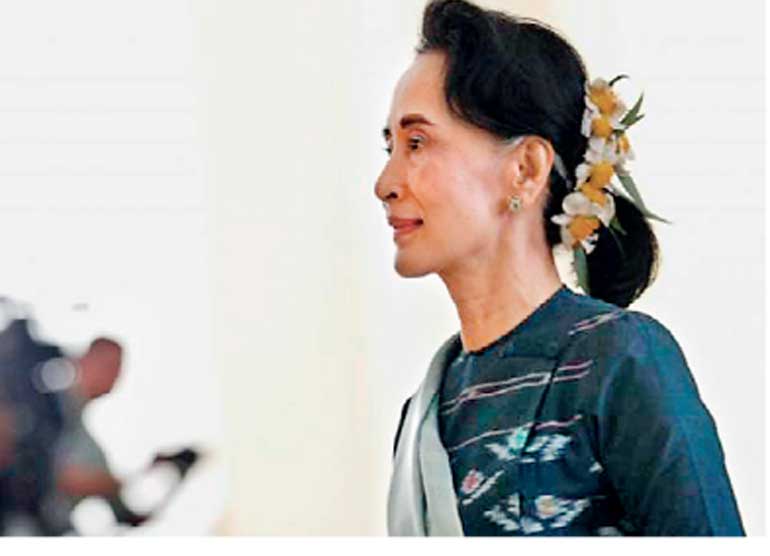Tuesday Feb 17, 2026
Tuesday Feb 17, 2026
Tuesday, 21 June 2016 00:01 - - {{hitsCtrl.values.hits}}
Yangon (Reuters): Myanmar leader Aung San Suu Kyi has told the U.N. Special Rapporteur on Human Rights that the government will avoid using the term “Rohingya” to describe a persecuted Muslim minority in the country’s northwest, an official told Reuters on Monday.
Members of the 1.1 million group, who identify themselves by the term “Rohingya” and live in apartheid-like conditions, are seen by many Myanmar Buddhists as illegal immigrants from Bangladesh. The term is a divisive issue.
The U.N. human rights investigator, Yanghee Lee, met Suu Kyi in the capital Naypyitaw on her first trip to Myanmar since the Nobel Peace Prize winner took power in April.
 National League for Democracy (NLD) party leader Aung San Suu Kyi arrives at Union Parliament in Naypyitaw, Myanmar 15 March, REUTERS
National League for Democracy (NLD) party leader Aung San Suu Kyi arrives at Union Parliament in Naypyitaw, Myanmar 15 March, REUTERS
Feted in the West for her role as champion of Myanmar’s democratic opposition during long years of military rule and house arrest, Suu Kyi has been criticized overseas, and by some in Myanmar, for saying little about the abuses faced by the Rohingya.
“At their meeting here this morning, our Foreign Minister Daw Aung San Suu Kyi explained our stance on this issue that the controversial terms should be avoided,” said Aung Lin, the Permanent Secretary at the Ministry of Foreign Affairs.
Suu Kyi is banned from presidency by the military-drafted constitution because her children have British citizenship. She holds offices of the State Counsellor and the Minister for Foreign Affairs, but is the de-facto leader of the administration.
She said during a visit by U.S. Secretary of State John Kerry last month that the country needed “space” to deal with the Rohingya issue and cautioned against the use of “emotive terms”, that she said were making the situation more difficult.
The previous military-linked government of former junta general Thein Sein referred to the group as “Bengalis”, implying they were illegal immigrants from Bangladesh, though many have lived in Myanmar for generations.
On Friday, Myanmar representative to the United Nations Human Rights Council Thet Thinzar Tun criticised use of “certain nomenclature” by a U.N. representative as “adding fuel to fire” and “only making things worse”.
“For the sake of harmony and mutual trust between two communities, it is advisable for everyone to use the term ‘the Muslim community in Rakhine State’,” said Thet Thinzar Tun, according to a video on the U.N. website.
U.N. High Commissioner for Human Rights Zeid Ra’ad Al Hussein on Monday called on Myanmar to end discrimination and human rights violations against minorities in a report that outlined those violations and focused particularly on the plight of the Rohingya.
Lee is reviled by radical nationalist Buddhists in Myanmar, whose leader, Wirathu, called her a “whore” after she urged the previous government to end the abuses of the Rohingya and criticised laws seen as discriminating non-Buddhists and women.
Some 125,000 Rohingya remain displaced and face severe travel restrictions in squalid camps since fighting erupted in Rakhine State between Buddhists and Muslims in 2012. Thousands have fled persecution and poverty.
Suu Kyi has formed a committee to “bring peace and development” to the state, but its plans are not clear.
Lee will meet several cabinet members and travel to areas where ethnic armed groups fight the military and sometimes between themselves, including Shan, Kachin and Rakhine states.
Aye Win, a U.N. official responsible for contacts with the media during Lee’s visit, declined to comment.